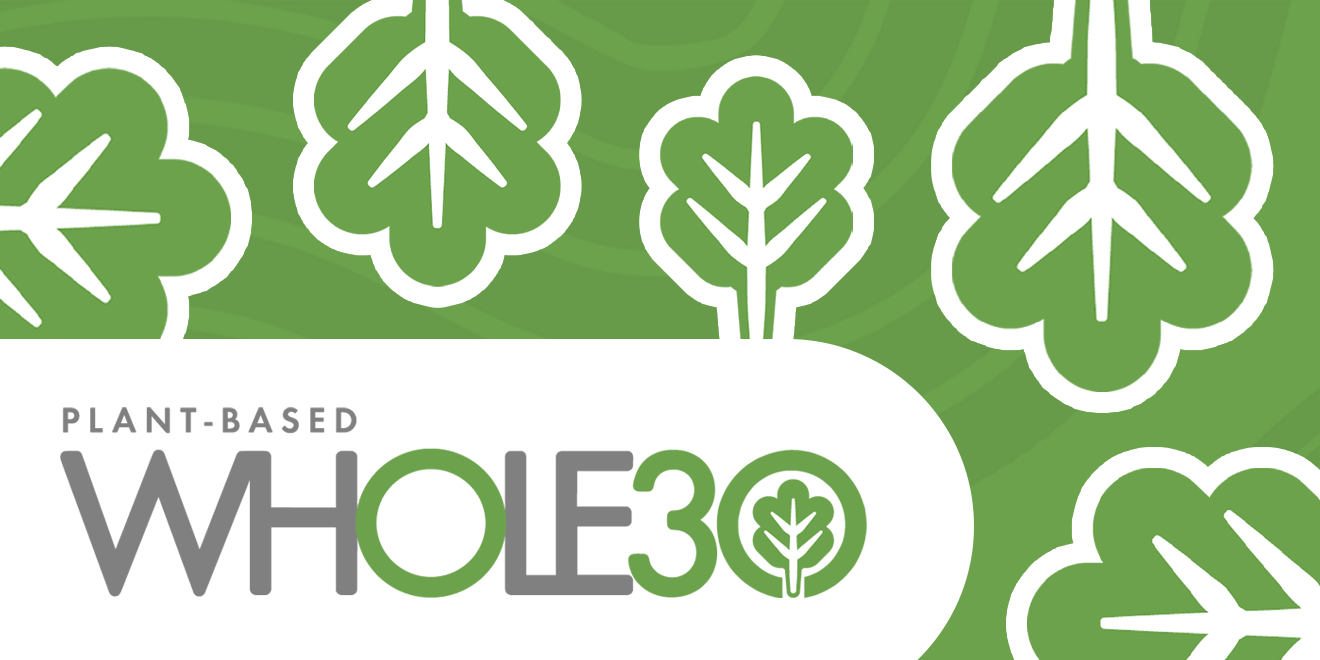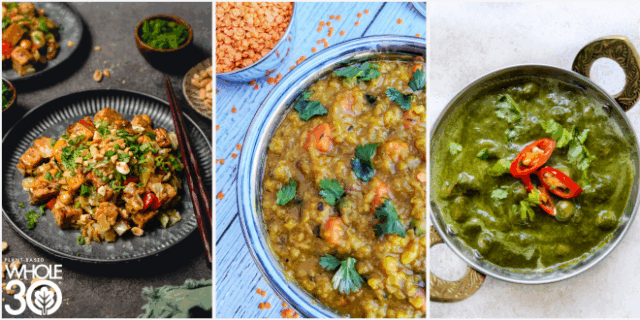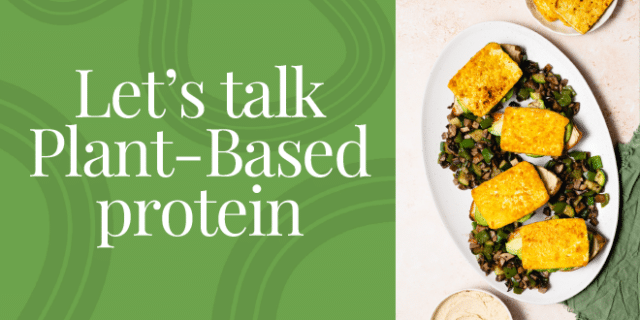Starting the Plant-Based Whole30 can be intimidating, overwhelming, and stressful if you don’t know where or even how to begin. No need to stress. I’m here to help. As a vegan dietitian, I can provide some tips, tricks, and tools to help you accomplish your next Plant-Based Whole30.
Let’s start with the basics.
The Plant-Based Whole30 is broken up into two different sections—elimination and reintroduction. The first 30 days you will eliminate all animal protein and fat, highly-processed forms of soy, added sugar, alcohol, grains, dairy, carrageenan, and sulfites from your diet. After the 30 days of elimination, you’ll have six-plus days of reintroduction where you will add each of those food groups back into your diet.
The program is designed to help you determine which plant-based foods will make you feel your best. By the end of the 30 days, you’ll know which foods to continue eating or which foods to eliminate entirely from your diet—or at least cut back on.
Here are the seven tips that are going to help you breeze through the Plant-Based Whole30, and maximize your chances of success.
Tip #1: Learn the Plant-Based Program Rules
Learning the program rules will make it that much easier for you to plan meals, grocery shop, and ensure you’ll have success with the program. So without further ado, let’s jump into it.
- Rule #1: No animal proteins. This includes things like chicken, beef, venison, and fish. All animal-based protein products are excluded from Plant-Based Whole30. This program rule includes eggs, too.
- Rule #2: No animal-based fats. This includes butter, ghee, or lard. Any fats that come from animal-based sources are excluded for your 30-day elimination.
- Rule #3: No highly processed forms of soy. This rule includes ingredients like textured vegetable protein, soybean oil, and soybean concentrate. To find compatible forms of soy you can check out our “Can I Have … ?” Guide.
- Rule #4: No added or artificial sugar. Maple syrup, date syrup, refined sugar, and coconut sugar are all out during the program.
- Rule #5: No alcohol in any form. And not even for cooking.
- Rule #6: No grains. You will eliminate wheat, barley, oats, millet, and sprouted grains from your diet. Anything from the grain category will be eliminated during the first 30 days.
- Rule #7: No animal-based dairy. You will be excluding milk, yogurt, cottage cheese, and anything that comes from an animal-based product. Not just cow’s milk, but goat’s milk and sheep’s milk, too.
- Rule #8: No carrageenan or sulfites. Make sure to check your ingredient labels. Both ingredients will be excluded on the Plant-Based Whole30.
- Rule #9: No recreation of baked goods or sweets. You can check out the Pancake Rule for the “why” behind this decision. But for 30 days, you cannot recreate your favorite muffin, scone, or cookie recipe with compatible ingredients.
- Rule #10: No stepping on the scale, no taking measurements for 30 days. The Plant-Based Whole30 program is about so much more than weight loss or measurement changes. The focus is on getting in tune with your body and knowing what foods make you feel good and what foods maybe don’t. So stay off the scale and away from the tape measure for the next 30 days.
We have a Plant-Based Whole30 Program Rules pdf download that outlines all of the program rules in more detail. You can download it here and keep it with you wherever you go.
Tip #2: The Importance of Preparation
Preparation is key to the program. Without proper preparation, you have no plan, and you have no way to know that your week’s going to be set up for your success. Flying by the seat of your pants might work at other times, but in the case of the Plant-Based Whole30, you’ll find yourself frustrated and wanting to give up before the month is over.
So having a plan going into the week can set you up for the biggest success with the Plant-Based Whole30 program. In addition, the Plant-Based Whole30 focuses on self-care. When you have a plan, you can ensure that you are properly taking care of yourself by the foods you put into your body.
Tip #3: Get Yourself Organized
Set yourself up for success by organizing your fridge and pantry. Look through and see what products you have that are already compatible, and remove ones you won’t be able to use on the program. Once you know what’s in your pantry and fridge, it makes it a lot easier to plan and prepare meals.
Fresh produce is one major part of your grocery list to stock up on. This includes things like celery, broccoli, leafy greens, and bell peppers. These can all be used during your Plant-Based Whole30, and are staples to keep you going and feeling full.
Check out these Plant-Based Whole30 Approved products to make your shopping easier.
Tip #4: Meal Plan
You should plan meals ahead of time before you even start the Plant-Based Whole30. We recommend starting to plan your meals the week before you start the program.
Ask yourself—What are you going to cook? What do you need to buy at the grocery store? Do you have compatible products on hand?
Planning your meals and preparing before your actual start date will make it smooth sailing. Then all you’ll have to do is cook, eat, and enjoy your delicious meals.
Tip #5: Know Your Why
Before starting your Plant-Based Whole30, you need to have the right mindset. Establish and know why you want to make these dietary changes. Is it for improved health? Better relationship with food? Are you curious about the effects of a plant-based diet?
If you’re doing the program on a whim, then you’re likely to revert back to old habits. You’ll be doing yourself a disservice and may not get the most out of the Plant-Based Whole30. But actually knowing and understanding why you are making these changes can lead to lifelong success and positive change.
Tip #6: Set Your Expectations
Knowing what to expect within that first week will help better prepare you for the program.
In the first week, you’re going to be eating a lot of different types of foods. Maybe they’re a little bit more fiber-rich and you’ll be eating more whole foods than your body’s used to.
You have to give yourself a little bit of time to adjust. So don’t think, “Oh my gosh, this is not going to work out!” Give yourself an adjustment period and keep going for the 30 days. Hopefully by the second week, you’re feeling good and starting to see non-scale victories stack up. And by the 30th day, you’re feeling the best you’ve ever felt!
Tip #7: Join the Plant-Based Whole30 Community
There are so many guides, resources, and humans to help you out. So jump into the community, and start talking with other Plant-Based Whole30ers. The Whole30 HQ team and community are all here to help find success and support you in any way.
This connection with other people who are also doing the Plant-Based Whole30 is really helpful. To stay even more connected, you can follow the Plant-Based Whole30 on Instagram and YouTube.
And if you haven’t already, be sure to sign up for the Plant-Based Whole30 email list. That way you’ll get tips directly to your inbox. You’ll be the first ones who know about new website articles, recipes, resources, and YouTube videos.
We are so excited to have you here and cannot wait to see how these next 30 days go for you. Please use all of the resources available and leave a comment or send us a direct message on Instagram to share how your Plant-Based Whole30 is going.
















